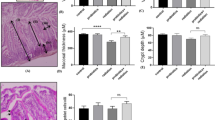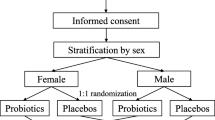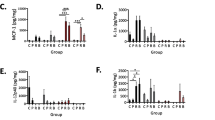Abstract
Radiation therapy has become one of the most important treatment modalities for human malignancy, but certain immediate and delayed side-effects on the normal surrounding tissues limit the amount of effective radiation that can be administered. After exposure of the abdominal region to ionizing radiation, nearly all patients experience transient symptoms of irradiation of the bowel. Acute-phase symptoms may persist for a short time, yet long-term complications can represent significant clinical conditions with high morbidity. Data from both experimental studies and clinical trials suggest the potential benefit for probiotics in radiation-induced enteritis and colitis. On the other hand, it is well evidenced that both useful and harmful effects of therapeutic applications of ionizing radiation upon living systems are ascribed to free-radical production. Therefore, the hypothesis that probiotics reinforce antioxidant defense systems of normal mucosal cells exposed to ionizing radiation may explain to an extent their beneficial action. The aim of this review is threefold: First, to make a short brief into the natural history of radiation injury to the intestinal tract. Second, to describe the primary interaction of ionizing radiation at the cellular level and demonstrate the participation of free radicals in the mechanisms of injury and, third, to try a more profound investigation into the antioxidant abilities of probiotics and prebiotics based on the available experimental and clinical data.
Similar content being viewed by others
References
Ballas LK, Elkin EB, Schrag D, Minsky BD, Bach PB. Radiation therapy facilities in the United States. Int J Radiat Oncol Biol Phys. 2006;66:1204–1211.
Wang J, Boerma M, Fu Q, Hauer-Jensen M. Significance of endothelial dysfunction in the pathogenesis of early and delayed radiation enteropathy. World J Gastroenterol. 2007;13:3047–3055.
Vozenin-Brotons MC. Tissue toxicity induced by ionizing radiation to the normal intestine: understanding the pathophysiological mechanisms to improve the medical management. World J Gastroenterol. 2007;13:3031–3032.
Berthrong M. Pathologic changes secondary to radiation. World J Surg. 1986;10:155–170.
Bismar MM, Sinicrope FA. Radiation enteritis. Curr Gastroenterol Rep. 2002;4:361–365.
Stone HB, Coleman CN, Anscher MS, McBride WH. Effects of radiation on normal tissue: consequences and mechanisms. Lancet Oncol. 2003;4:529–536.
Akpolat M, Kanter M, Uzal MC. Protective effects of curcumin against gamma radiation-induced ileal mucosal damage. Arch Toxicol. 2009;83:609–617.
Denham JW, Hauser-Jensen M. The radiotherapeutic injury-a complex ‘wound’. Radiother Oncol. 2002;63:129–145.
Zhao W, Robbins ME. Inflammation and chronic oxidative stress in radiation-induced late normal tissue injury: therapeutic implications. Curr Med Chem. 2009;16:130–143.
Weiss JF, Landauer MR. Radioprotection by antioxidants. Ann NY Acad Sci. 2000;899:44–60.
Weiss JF. Pharmacologic approaches to protection against radiation-induced lethality and other damage. Environ Health Perspect. 1997;105:1473–1478.
Nair CKK, Parida DK, Nomura T. Radioprotectors in radiotherapy. J Radiat Res. 2001;42:21–37.
Wu W, Abraham L, Ogony J, Matthews R, Goldstein G, Ercal N. Effects of N-acetylcysteine amide (NACA), a thiol antioxidant on radiation-induced cytotoxicity in Chinese hamster ovary cells. Life Sci. 2008;82:1122–1130.
Sazawal S, Hiremath G, Dhingra U, Malik P, Deb S, Black RE. Efficacy of probiotics in prevention of acute diarrhoea: a meta-analysis of masked, randomized, placebo-controlled trials. Lancet Infect Dis. 2006;6:374–382.
Johnson-Henry KC, Mitchell DJ, Avitzur Y, Galindo-Mata E, Jones NL, Sherman PM. Probiotics reduce bacterial colonization, gastric inflammation in H. pylori-infected mice. Dig Dis Sci. 2004;49:1095–1102.
Kukkonen K, Savilahti E, Haahtela T, et al. Probiotics and prebiotic galacto-oligosaccharides in the prevention of allergic diseases: a randomized, double-blind, placebo-controlled trial. J Allergy Clin Immunol. 2007;119:192–198.
Madsen KL. The use of probiotics in gastrointestinal disease. Can J Gastroenterol. 2001;15:817–822.
Fotiadis CI, Stoidis CN, Spyropoulos BG, Zografos ED. Role of probiotics, prebiotics and synbiotics in chemoprevention for colorectal cancer. World J Gastroenterol. 2008;14:6453–6457.
Wollowski I, Rechkemmer G, Pool-Zobel BL. Protective role of probiotics and prebiotics in colon cancer. Am J Clin Nutr. 2001;73:451S–455S.
Barbara G, Stanghellini V, Cremon C, et al. Probiotics and irritable bowel syndrome: rationale and clinical evidence for their use. J Clin Gastroenterol. 2008;42:S214–S217.
Ewaschuk JB, Dieleman LA. Probiotics and prebiotics in chronic inflammatory bowel diseases. World J Gastroenterol. 2006;12:5941–5950.
Peran L, Sierra S, Comalada M, et al. A comparative study of the preventative effects exerted by two probiotics, Lactobacillus reuteri and Lactobacillus fermentum, in the trinitrobenzenesulfonic acid model of rat colitis. Br J Nutr. 2007;97:96–103.
Peran L, Camuesco D, Comalada M, et al. Preventative effects of a probiotic, Lactobacillus salivarius ssp. salivarius, in the TNBS model of rat colitis. World J Gastroenterol. 2005;11:5185–5192.
Guarner F, Malagelada JR. Role of bacteria in experimental colitis. Best Pract Res Clin Gastroenterol. 2003;17:793–804.
Seal M, Naito Y, Barreto R, Lorenzetti A, Safran P, Marotta F. Experimental radiotherapy-induced enteritis: a probiotic interventional study. J Dig Dis. 2007;8:143–147.
Demirer S, Aydintug S, Aslim B, et al. Effects of probiotics on radiation-induced intestinal injury in rats. Nutrition. 2006;22:179–186.
Delia P, Sansotta G, Donato V, et al. Use of probiotics for prevention of radiation-induced diarrhea. World J Gastroenterol. 2007;13:912–915.
Ciorba MA, Stenson WF. Probiotic therapy in radiation-induced intestinal injury and repair. Ann NY Acad Sci. 2009;1165:190–194.
Smith DH, DeCosse JJ. Radiation damage to the small intestine. World J Surg. 1986;10:189–194.
Andreyev J. Gastrointestinal symptoms after pelvic radiotherapy: a new understanding to improve management of symptomatic patients. Lancet Oncol. 2007;8:1007–1017.
Cengiz M, Akbulut S, Atahan IL, Grigsby PW. Acute phase response during radiotherapy. Int J Radiat Oncol Biol Phys. 2001;46:1093–1096.
Westergaard H. Bile acid malabsorption. Curr Treat Options Gastroenterol. 2007;10:28–33.
Erbil Y, Oztezcan S, Giriş M, et al. The effect of glutamine on radiation-induced organ damage. Life Sci. 2005;78:376–382.
Cho LC, Antoine JE. Radiation injury to the gastrointestinal tract. In: Feldman M, Friedman LS, Sleisenger MH, eds. Sleisenger & Fordtran’s Gastrointestinal and Liver Disease. 8th ed. Philadelphia: WB Saunders; 2006:813–826.
Turina M, Mulhall AM, Mahid SS, Yashar C, Galandiuk S. Frequency and surgical management of chronic complications related to pelvic radiation. Arch Surg. 2008;143:46–52.
Galland RB, Spencer J. Natural history and surgical management of radiation enteritis. Br J Surg. 1987;74:742–747.
Abayomi J, Kirwan J, Hackett A. The prevalence of chronic radiation enteritis following radiotherapy for cervical or endometrial cancer and its impact on quality of life. Eur J Oncol Nurs. 2009;13:262–267.
Regimbeau JM, Panis Y, Gouzi JL, Fagniez PL. Operative and long-term results after surgery for chronic radiation enteritis. Am J Surg. 2001;182:237–242.
Hauser-Jensen M, Wang J, Denham JW. Bowel injury: current and evolving management strategies. Semin Radiat Oncol. 2003;13:357–371.
Cox JD, Byhardt RW, Wilson JF, Haas JS, Komaki R, Olson LE. Complications of radiation therapy and factors in their prevention. World J Surg. 1986;10:171–188.
Rubio CA, Jalnas M. Dose-time-dependent histological changes following irradiation of the small intestine of rats. Dig Dis Sci. 1996;41:392–401.
Gavazzi C, Bhoori S, Lovullo S, Cozzi G, Mariani L. Role of home parenteral nutrition in chronic radiation enteritis. Am J Gastroenterol. 2006;101:374–379.
Muttillo IA, Elias D, Bolognese A, et al. Surgical treatment of severe late radiation injury to the bowel: a retrospective analysis of 83 cases. Hepatogastroenterology. 2002;49:1023–1026.
Dörr W, Hendry JH. Consequential late effects in normal tissues. Radiother Oncol. 2001;61:223–231.
Matsuu-Matsuyama M, Shichijo K, Okaichi K, et al. Sucralfate protects intestinal epithelial cells from radiation-induced apoptosis in rats. J Radiat Res (Tokyo). 2006;47:1–8.
Hwang JM, Chan DC, Chang TM, et al. Effects of oral arginine and glutamine on radiation-induced injury in the rat. J Surg Res. 2003;109:149–154.
Ersin S, Tuncyurek P, Esassolak M, et al. The prophylactic and therapeutic effects of glutamine- and arginine-enriched diets on radiation-induced enteritis in rats. J Surg Res. 2000;89:121–125.
Waddell BE, Rodriguez-Bigas MA, Lee RJ, Weber TK, Petrelli NJ. Prevention of chronic radiation enteritis. J Am Coll Surg. 1999;189:611–624.
Ben-Josef E, Han S, Tobi M, et al. Intrarectal application of amifostine for the prevention of radiation-induced rectal injury. Semin Riadiat Oncol. 2002;12:81–85.
Giriş M, Erbil Y, Oztezcan S, et al. The effect of heme oxygenase-1 induction by glutamine on radiation-induced intestinal damage: the effect of heme oxygenase-1 on radiation enteritis. Am J Surg. 2006;191:503–509.
Diestel CF, Marques RG, Lopes-Paulo F, et al. Role of l-glutamine and glycine supplementation on irradiated colonic wall. Int J Colorectal Dis. 2007;22:1523–1529.
Johnston MJ, Robertson GM, Frizelle FA. Management of late complications of pelvic radiation in the rectum and anus: a review. Dis Colon Rectum. 2003;46:247–259.
Hovdenak N, Fajardo LF, Hauser-Jensen M. Acute radiation proctitis: a sequential clinicopathologic study during pelvic radiotherapy. Int J Radiat Oncol Biol Phys. 2000;48:1111–1117.
Wang CJ, Leung SW, Chen HC, et al. The correlation of acute toxicity and late rectal injury in radiotherapy for cervical carcinoma: evidence suggestive of consequential late effect (CQLE). Int J Radiat Oncol Biol Phys. 1998;40:85–91.
Babb RR. Radiation proctitis: a review. Am J Gastroenterol. 1996;91:1309–1311.
Kountouras J, Zavos C. Recent advances in the management of radiation colitis. World J Gastroenterol. 2008;14:7289–7301.
Tagkalidis PP, Tjandra JJ. Chronic radiation proctitis. ANZ J Surg. 2001;71:230–237.
Williams HR, Vlavianos P, Blake P, Dearnaley DP, Tait D, Andreyev HJ. The significance of rectal bleeding after pelvic radiotherapy. Aliment Pharmacol Ther. 2005;21:1085–1090.
Tamai O, Nozato E, Miyazato H, et al. Radiation-associated rectal cancer: report of four cases. Dig Surg. 1999;16:238–243.
Gillette EL, Gillette SM. Principles of radiation therapy. Semin Vet Med Surg (Small Anim). 1995;10:129–134.
Thomson A, Hemphill D, Jeejeebhoy KN. Oxidative stress and antioxidants in intestinal disease. Dig Dis. 1998;16:152–158.
Valko M, Leibfritz D, Moncol J, Cronin MT, Mazur M, Telser J. Free radicals and antioxidants in normal physiological functions and human disease. Int J Biochem Cell Biol. 2007;39:44–84.
Abou-Seif MA, El-Naggar MM, El-Far M, Ramadan M, Salah N. Amelioration of radiation-induced oxidative stress and biochemical alteration by SOD model compounds in pre-treated gamma-irradiated rats. Clin Chim Acta. 2003;337:23–33.
Empey LR, Papp JD, Jewell LD, Fedorak RN. Mucosal protective effects of vitamin E and misoprostol during acute radiation-induced enteritis in rats. Dig Dis Sci. 1992;37:205–214.
De Grey AD. HO2*: the forgotten radical. DNA Cell Biol. 2002;21:251–257.
Sobko T, Reinders C, Norin E, Midtvedt T, Gustafsson LE, Lundberg JO. Gastrointestinal nitric oxide generation in germ-free and conventional rats. Am J Physiol Gastrointest Liver Physiol. 2004;287:G993–G997.
Freeman SL, MacNaughton WK. Ionizing radiation induces iNOS-mediated epithelial dysfunction in the absence of an inflammatory response. Am J Physiol Gastrointest Liver Physiol. 2000;278:G243–G250.
Erbil Y, Dibekoglu C, Turkoglu U, et al. Nitric oxide and radiation enteritis. Eur J Surg. 1998;164:863–868.
Pacher P, Beckman JS, Liaudet L. Nitric oxide and peroxynitrite in health and disease. Physiol Rev. 2007;87:315–324.
Kilciksiz S, Demirel C, Erdal N, et al. The effect of N-acetylcysteine on biomarkers for radiation-induced oxidative damage in a rat model. Acta Med Okayama. 2008;62:403–409.
Barker S, Weinfeld M, Zheng J, Li L, Murray D. Identification of mammalian proteins cross-linked to DNA by ionizing radiation. J Biol Chem. 2005;280:33826–33838.
Stadtman ER. Protein oxidation and aging. Science. 1992;257:1220–1224.
Taysi S, Koc M, Büyükokuroğlu ME, Altinkaynak K, Sahin YN. Melatonin reduces lipid peroxidation and nitric oxide during irradiation-induced oxidative injury in the rat liver. J Pineal Res. 2003;34:173–177.
Valko M, Morris H, Cronin MT. Metals, toxicity and oxidative stress. Curr Med Chem. 2005;12:1161–1208.
Marnett LJ. Oxy radicals, lipid peroxidation and DNA damage. Toxicology. 2002;181–182:219–222.
Matés JM, Sánchez-Jiménez FM. Role of reactive oxygen species in apoptosis: implications for cancer therapy. Int J Biochem Cell Biol. 2000;32:157–170.
Molla M, Panes J. Radiation-induced intestinal inflammation. World J Gastroenterol. 2007;13:3043–3046.
Robbins ME, Zhao W. Chronic oxidative stress and radiation-induced late normal tissue injury: a review. Int J Radiat Biol. 2004;80:251–259.
Hwang ES, Kim GH. Biomarkers for oxidative stress status of DNA, lipids, and proteins in vitro and in vivo cancer research. Toxicology. 2007;229:1–10.
Kligler B, Cohrssen A. Probiotics. Am Fam Physician. 2008;78:1073–1078.
Lomax AR, Calder PC. Prebiotics, immune function, infection and inflammation: a review of the evidence. Br J Nutr. 2009;101:633–658.
Kapkac M, Erikoglu M, Tuncyurek P, et al. Fiber enriched diets and radiation induced injury of the gut. Nutr Res. 2003;23:77–83.
De Vrese M, Schrezenmeir J. Probiotics, prebiotics, and synbiotics. Adv Biochem Eng Biotechnol. 2008;111:1–66.
Otamiri T, Sjödahl R. Oxygen radicals: their role in selected gastrointestinal disorders. Dig Dis. 1991;9:133–141.
Indaram AV, Visvalingam V, Locke M, Bank S. Mucosal cytokine production in radiation-induced proctosigmoiditis compared with inflammatory bowel disease. Am J Gastroenterol. 2000;95:1221–1225.
Mutlu-Türkoğlu U, Erbil Y, Oztezcan S, Olgaç V, Toker G, Uysal M. The effect of selenium and/or vitamin E treatments on radiation-induced intestinal injury in rats. Life Sci. 2000;66:1905–1913.
Grisham MB, MacDermott RP, Deitch EA. Oxidant defense mechanisms in the human colon. Inflammation. 1990;14:669–680.
Haton C, François A, Vandamme M, Wysocki J, Griffiths NM, Benderitter M. Imbalance of the antioxidant network of mouse small intestinal mucosa after radiation exposure. Radiat Res. 2007;167:445–453.
Adaramoye O, Ogungbenro B, Anyaegbu O, Fafunso M. Protective effects of extracts of Vernonia amygdalina, Hibiscus sabdariffa and vitamin C against radiation-induced liver damage in rats. J Radiat Res (Tokyo). 2008;49:123–131.
Koc M, Taysi S, Buyukokuroglu ME, Bakan N. Melatonin protects rat liver against irradiation-induced oxidative injury. J Radiat Res (Tokyo). 2003;44:211–215.
Seguí J, Gironella M, Sans M, et al. Superoxide dismutase ameliorates TNBS-induced colitis by reducing oxidative stress, adhesion molecule expression, and leukocyte recruitment into the inflamed intestine. J Leukoc Biol. 2004;76:537–544.
Mollà M, Gironella M, Salas A, et al. Protective effect of superoxide dismutase in radiation-induced intestinal inflammation. Int J Radiat Oncol Biol Phys. 2005;61:1159–1166.
Han W, Mercenier A, Ait-Belgnaoui A, et al. Improvement of an experimental colitis in rats by lactic acid bacteria producing superoxide dismutase. Inflamm Bowel Dis. 2006;12:1044–1052.
Carroll IM, Andrus JM, Bruno-Bárcena JM, Klaenhammer TR, Hassan HM, Threadgill DS. Anti-inflammatory properties of Lactobacillus gasseri expressing manganese superoxide dismutase using the interleukin 10-deficient mouse model of colitis. Am J Physiol Gastrointest Liver Physiol. 2007;293:G729–G738.
Kullisaar T, Zilmer M, Mikelsaar M, et al. Two antioxidative lactobacilli strains as promising probiotics. Int J Food Microbiol. 2002;72:215–224.
Chang SK, Hassan HM. Characterization of superoxide dismutase in Streptococcus thermophilus. Appl Environ Microbiol. 1997;63:3732–3735.
de LeBlanc A, LeBlanc JG, Perdigón G, et al. Oral administration of a catalase-producing Lactococcus lactis can prevent a chemically induced colon cancer in mice. J Med Microbiol. 2008;57:100–105.
Pompella A, Visvikis A, Paolicchi A, De Tata V, Casini AF. The changing faces of glutathione, a cellular protagonist. Biochem Pharmacol. 2003;66:1499–1503.
Buffinton GD, Doe WF. Depleted mucosal antioxidant defenses in inflammatory bowel disease. Free Radic Biol Med. 1995;19:911–918.
Loguercio C, D’Argenio G, Delle Cave M, et al. Glutathione supplementation improves oxidative damage in experimental colitis. Dig Liver Dis. 2003;35:635–641.
Witschi A, Reddy S, Stofer B, Lauterburg BH. The systemic availability of oral glutathione. Eur J Clin Pharmacol. 1992;43:667–669.
Mansour HH, Hafez HF, Fahmy NM, Hanafi N. Protective effect of N-acetylcysteine against radiation induced DNA damage and hepatic toxicity in rats. Biochem Pharmacol. 2008;75:773–780.
Verrecchia F, Mauviel A. Transforming growth factor-beta and fibrosis. World J Gastroenterol. 2007;13:3056–3062.
Richter KK, Langberg CW, Sung CC, Hauer-Jensen M. Association of transforming growth factor beta (TGF-beta) immunoreactivity with specific histopathologic lesions in subacute and chronic experimental radiation enteropathy. Radiother Oncol. 1996;39:243–251.
Lui RM, Pravia KA. Oxidative stress and glutathione in TGF-beta-mediated fibrogenesis. Free Radic Biol Med. 2010;48:1–15.
Musenga A, Mandrioli R, Bonifazi P, Kenndler E, Pompei A, Raggi MA. Sensitive and selective determination of glutathione in probiotic bacteria by capillary electrophoresis-laser induced fluorescence. Anal Bioanal Chem. 2007;387:917–924.
Peran L, Camuesco D, Comalada M, et al. Lactobacillus fermentum, a probiotic capable to release glutathione, prevents colonic inflammation in the TNBS model of rat colitis. Int J Colorectal Dis. 2006;21:737–746.
Lutgendorff F, Trulsson LM, van Minnen LP, et al. Probiotics enhance pancreatic glutathione biosynthesis and reduce oxidative stress in experimental acute pancreatitis. Am J Physiol Gastrointest Liver Physiol. 2008;295:G1111–G1121.
Lutgendorff F, Nijmeijer RM, Sandström PA, et al. Probiotics prevent intestinal barrier dysfunction in acute pancreatitis in rats via induction of ileal mucosal glutathione biosynthesis. PLoS One. 2009;4:e4512.
Kodali VP, Sen R. Antioxidant and free radical scavenging activities of an exopolysaccharide from a probiotic bacterium. Biotechnol J. 2008;3:245–251.
Sengül N, Aslím B, Uçar G, et al. Effects of exopolysaccharide-producing probiotic strains on experimental colitis in rats. Dis Colon Rectum. 2006;49:250–258.
Lin MY, Yen CL. Antioxidative ability of lactic acid bacteria. J Agric Food Chem. 1999;47:1460–1466.
Lee J, Hwang KT, Heo MS, Lee JH, Park KY. Resistance of Lactobacillus plantarum KCTC 3099 from Kimchi to oxidative stress. J Med Food. 2005;8:299–304.
Acknowledgments
The authors state that there was no extra-institutional funding. Supported by the National and Kapodιstrian University of Athens, Athens, Greece.
Competing interests
The authors declare that they have no competing interests.
Authors’ contributions
BGS, EPM, CNS, and CF have made contributions to conception and design. BGS and EPM contributed to the analysis and interpretation of data and wrote the manuscript. All authors read and approved the final manuscript. All authors contributed equally to the final draft of the manuscript. CF has given the final approval of the version to be published.
Author information
Authors and Affiliations
Corresponding author
Rights and permissions
About this article
Cite this article
Spyropoulos, B.G., Misiakos, E.P., Fotiadis, C. et al. Antioxidant Properties of Probiotics and Their Protective Effects in the Pathogenesis of Radiation-Induced Enteritis and Colitis. Dig Dis Sci 56, 285–294 (2011). https://doi.org/10.1007/s10620-010-1307-1
Received:
Accepted:
Published:
Issue Date:
DOI: https://doi.org/10.1007/s10620-010-1307-1




